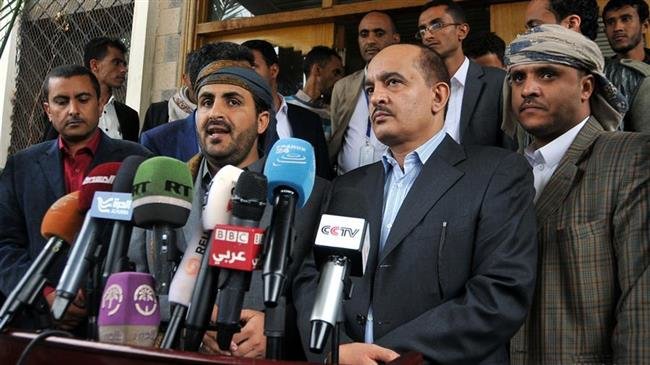Truce agreement victory for Yemeni nation: Abdulsalam


Yemen’s Houthi movement says a ceasefire agreed between the warring sides in Yemen is a victory for the war-torn country as it will stop Saudi attacks on the strategic city of Hudaydah.
Houthi chief negotiator Mohammed Abdulsalam made the remarks in an interview with Al-Masirah TV, shortly after the warring parties reached a ceasefire agreement after days of UN-brokered talks in Sweden.
Based on the deal, “the existing local authorities will be officially in charge of controlling the city and establishing security there under the supervision of the UN,” Abdulsalam said.
The Houthi delegation and Saudi-backed former government agreed that the UN would play a “leading role” in Hudaydah, which is currently controlled by the Houthis.
They also agreed to reopen the airport in the capital Sana’a, which was shuttered last year after numerous attacks by Saudi Arabia.
The UN chief says warring parties of Yemen have reached an agreement to hold a ceasefire in the port city of Hudaydah.
The Riyadh-backed side, which represented former Yemeni president Abd Rabbuh Mansour Hadi in the Stockholm talks, said on Friday that the Houthis must hand over the key port.
However, Abdulsalam strongly rejected the proposal, saying Hudaydah must be kept apart from the military conflict, and that a government should be formed first before all parties are disarmed.
Forces loyal to Hadi and the Saudi-led mercenaries were forced to sit for talks with the Houthi Ansarullah movement after their massive operation to seize the port city of Hudaydah failed.
Saudi Arabia and the United Arab Emirates had deployed about 10,000 troops to Yemen’s west coast after repeated campaigns to seize Hudaydah were thwarted by the Houthis and their allies.
Ansarullah calls the truce deal a defeat for the Saudis as it stops the aggression, allows existing local protectors who thwarted the Saudi offensive to be in charge of the city, and allows the Yemeni nation to regain their access to food, medicine, and other basic supplies.
Around 14 million people have been pushed to the brink of starvation since the Saudi war began in 2015, according to the UN.
The United Nations has warned about the rapidly deteriorating humanitarian situation in Yemen’s Hudaydah.
Cessation of Saudi aggression
In his remarks, Abdulsalam said there is no sign that the Saudis are going to stop their aggression against the innocent people of Yemen despite the ceasefire deal.
One of the articles of the draft agreement proposed by the Ansarullah delegation is “the complete cessation of military actions in Yemen,” but the Saudi side is rejecting it, he said.
“The UN has two options ahead of itself: it should either start the political process from the scratch or begin the political process from the draft version of the framework deal proposed in Sweden.”
Abdulsalam also called on the Yemenis to remain vigilant, especially in Hudaydah and Tai’zz, and continue supporting the Yemeni army and popular committees.
“Those who have shown resistance against 17 countries for four years can achieve a brilliant victory,” he added.
Saudi Arabia invaded Yemen in March 2015 in an attempt to reinstall Hadi, who had resigned amid popular discontent and fled to Riyadh.
Saudi Arabia buys the bulk of its weapons used in war from the US, Britain and France.
The US Senate on Thursday voted to stop US armed forces from supporting Saudi Arabia in its military aggression against Yemen.
The historic bipartisan vote for the first time invoked Congress’ war powers to challenge US military involvement abroad despite the Trump administration’s unwavering support for the Saudi regime.
The US Senate votes to end American military support for the Saudi-led war on Yemen.
US bills Saudis, Emiratis $331mn for refueling warplanes in Yemen
The US Department of Defense said Thursday it has sent Saudi Arabia and its main partner, the United Arab Emirates, a $331-million bill for the fuel their warplanes have received from American refueling aircraft during the past four years in the Yemen war.
“Due to errors in accounting by the Pentagon, the United States had not properly charged Saudi Arabia and the United Arab Emirates for those services,” Senator Jack Reed of Rhode Island, the senior Democrat on the Armed Services Committee, said in a statement.
Specifically, the Pentagon is seeking about $36.8 million for jet fuel and $294.3 million for flight hours by American refueling aircraft, Cmdr. Rebecca Rebarich, a Pentagon spokeswoman, said.
The United States refueled Saudi and Emirati warplanes operating in Yemen from March 2015 until Nov. 11. However, a resolution approved by the Senate on Thursday would keep the Pentagon from restarting that support.










